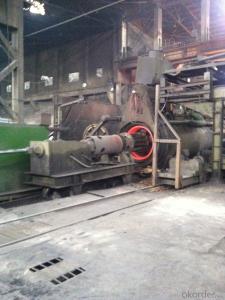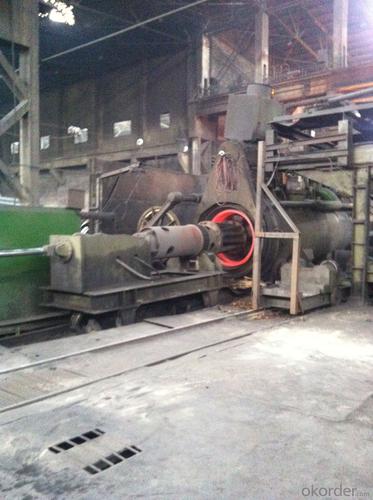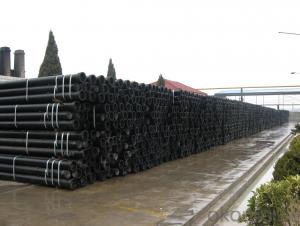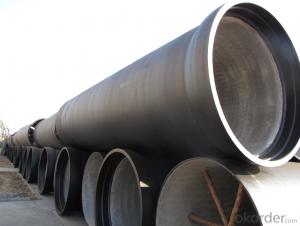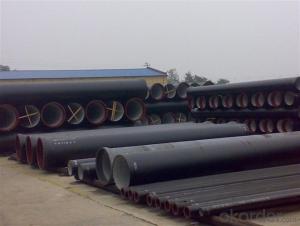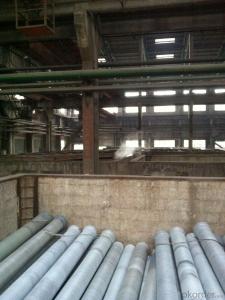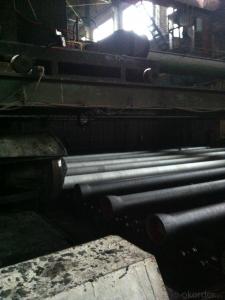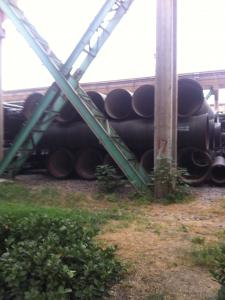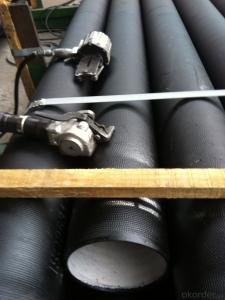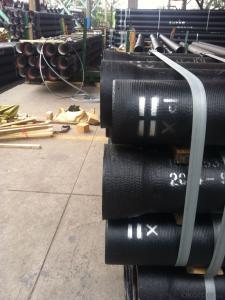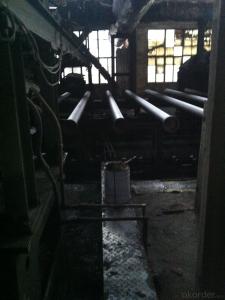DUCTILE IRON PIPES AND PIPE FITTINGS K9 CLASS DN450
- Loading Port:
- Tianjin
- Payment Terms:
- TT OR LC
- Min Order Qty:
- 33 pc
- Supply Capability:
- 3000 pc/month
OKorder Service Pledge
OKorder Financial Service
You Might Also Like
Material : Ductile Cast Iron
Size Range : DN 80mm to DN 2000mm
Unit Effective Length : 6m or 5.7m
Manufacture Standard: ISO 2531:1998/ EN 545:2006/EN 598:2007
Annual capacity : 200,000 tons
Coating Exterior: Zinc 130g/m2 according to ISO 8179-1 and bitumen coating 70 microns.
Cement Interior: Portland Cement/ High Alumina Cement/ Sulphate Resisting Cement Lining according to ISO 4179
Special requirements on external coating and internal lining can be applied
We also provide accessories such as SBR/EPDM rubber gaskets, lubricant paste, pipe caps, PE sleeves, etc.
Additional Parts:
Each pipe is strictly inspected according to related standard to ensure permanently high performance.
Easy Installation at site and service free for life
Long Service Lifespan
Quotation will arrive you within 24hours once we get your inquiry.
We guarantee offering you a competitive price.
A copy of original inspection reports of pipes will be offered after shipment.
Photos of loading process will be sent to the customer after shipment effect.
We will follow-up the delivery progress after shipment effect and update to the customer on weekly basis.
- Q: Can ductile iron be welded? Is weldability comparable to gray iron?
- Suitable for the full range of cold welding welding, welding cast iron base material can almost all, and it is easy to achieve cast iron and carbon steel dissimilar metal welding, such as solving matrix fracture, crack, wear, hole filling defects after welding can be machined, many applications in the engine casing, cylinder head, casting machine, gear base the tooth of iron castings.
- Q: Does centrifugal cast iron pipe work well with lining cement? Will it scale and breed bacteria?
- Poor hydraulic performance and high energy consumption. The roughness coefficient of the prestressed reinforced concrete pipe is between 0.013 - 0.014, so that the pipeline resistance of the pipeline with the same pipe diameter is higher than that of the same water content. Because of its high roughness, after a period of use, the pipeline will be blocked by bacteria, shellfish breeding and reproduction. As the service life increases, the inner diameter of the pipe will gradually shrink and the resistance will increase.
- Q: How are ductile iron pipes restrained against axial thrust forces?
- Axial thrust forces are effectively restrained in ductile iron pipes by utilizing both mechanical restraints and soil resistance. A commonly employed method involves the use of thrust blocks, which are concrete structures constructed at bends, tees, and other directional changes in the pipeline. These blocks are specifically designed to withstand axial forces and prevent any shifting or movement of the pipes caused by the pressure exerted by the flowing fluid. Furthermore, additional support and prevention of axial movement are achieved through the implementation of mechanical restraints, such as pipe restraints, thrust collars, and anchor blocks. Pipe restraints are devices installed around the pipe and connected to adjacent structures, such as walls or concrete collars, in order to prevent any sort of movement. Thrust collars, on the other hand, are utilized to absorb and distribute the thrust forces generated by the flowing fluid. These collars, typically made of ductile iron or steel, are securely fastened around the pipe to counteract axial movement. Moreover, soil resistance plays a crucial role in restraining axial thrust forces. The weight of the soil surrounding the pipe creates frictional resistance, which effectively counteracts the axial forces. In order to ensure effective soil resistance, it is vital to properly backfill the trench, compact the soil, and adequately embed the pipe in the soil. In conclusion, a comprehensive approach involving the use of mechanical restraints such as thrust blocks, pipe restraints, and thrust collars, along with the soil resistance provided by proper trench backfilling and compaction, is employed to restrain axial thrust forces in ductile iron pipes. This approach guarantees the secure placement of the pipes and their ability to withstand the axial forces exerted by the flowing fluid.
- Q: Can ductile iron pipes be used for pressure relief systems?
- Indeed, pressure relief systems can make use of ductile iron pipes. Renowned for their robustness, longevity, and capacity to endure intense pressure circumstances, ductile iron pipes possess a remarkable resilience against both internal and external pressures. Consequently, they prove to be ideal for deployment within pressure relief systems. Furthermore, ductile iron pipes can withstand considerable fluctuations in pressure without jeopardizing their structural integrity. Consequently, they find widespread usage in various settings necessitating pressure relief systems, including water supply networks, wastewater treatment facilities, and industrial operations.
- Q: Can ductile iron pipes be used for trenchless pipe rehabilitation methods?
- Yes, ductile iron pipes can be used for trenchless pipe rehabilitation methods. Trenchless pipe rehabilitation methods involve repairing or rehabilitating existing pipelines without the need for extensive excavation or trenching. Ductile iron pipes are commonly used in these methods due to their durability, strength, and resistance to corrosion. They can be rehabilitated using various trenchless methods such as pipe lining, pipe bursting, and slip lining. These methods involve inserting a new lining or pipe inside the existing ductile iron pipe, thereby extending its lifespan and improving its structural integrity. Ductile iron pipes are preferred for trenchless rehabilitation as they can withstand the forces and pressures involved in the process while providing a long-lasting and reliable solution.
- Q: Can ductile iron pipes be used in agricultural applications?
- Yes, ductile iron pipes can be used in agricultural applications. Ductile iron pipes are known for their strength, durability, and corrosion resistance, making them suitable for various agricultural uses such as irrigation systems, water supply networks, and drainage systems. They can withstand high pressure, handle heavy loads, and are also resistant to external factors like soil movements and root penetration.
- Q: Principles for the antiseptic treatment of ductile iron pipes
- The principle that the antiseptic treatment of ductile iron pipes must be complied with is that.1. internal and external surface coating shall be kept clean, remove rust and impurities2. after coating on the inside and outside surface, the coating should be even and smooth, firm and firm, and shall not be abnormal because of climate change3. coating for water delivery should be insoluble in water, no peculiar smell, harmful impurities content
- Q: Is the spigot and socket connection of the ductile iron tube reversed?
- The tube is heated, in forming model, and the tube is arranged in the pipe drawing die; under the pressure of the tube is radially compressed, in radial compression in the direction of flow and the formation of metal pipe to pipe in the drawing die.
- Q: Can ductile iron pipes be used in marine environments?
- Yes, ductile iron pipes can be used in marine environments. Ductile iron is a type of cast iron that exhibits excellent mechanical properties, high corrosion resistance, and durability. These properties make it suitable for various applications, including marine environments. Marine environments are known to be highly corrosive due to the presence of saltwater, high humidity, and other harsh conditions. However, ductile iron pipes are designed to withstand such conditions. They have a protective layer called the "graphite skin" that acts as a barrier against corrosion. This graphite skin helps to prevent the formation of rust and protects the pipe from degradation. Furthermore, ductile iron pipes can also be protected with additional coatings or linings to enhance their resistance to corrosion in marine environments. These protective coatings can include epoxy, polyurethane, or zinc coatings. These coatings act as an extra layer of defense against corrosion, ensuring the longevity and reliability of the pipes in marine environments. It is important to note that proper maintenance and regular inspection are necessary to ensure the optimal performance of ductile iron pipes in marine environments. This includes regular cleaning to remove any marine growth or debris that may accumulate on the pipes and conducting routine inspections to detect any signs of corrosion or damage. In conclusion, ductile iron pipes can indeed be used in marine environments. Their inherent corrosion resistance, durability, and the ability to apply additional protective coatings make them a suitable choice for various marine applications.
- Q: What are the interface forms of ductile iron pipes? The best drawings are available. Thank you
- There are many kinds of ductile iron pipe interfaces, and the T type interface (sliding type) flexible interface is famous for its fast installation and simple installation.
Send your message to us
DUCTILE IRON PIPES AND PIPE FITTINGS K9 CLASS DN450
- Loading Port:
- Tianjin
- Payment Terms:
- TT OR LC
- Min Order Qty:
- 33 pc
- Supply Capability:
- 3000 pc/month
OKorder Service Pledge
OKorder Financial Service
Similar products
Hot products
Hot Searches
Related keywords
